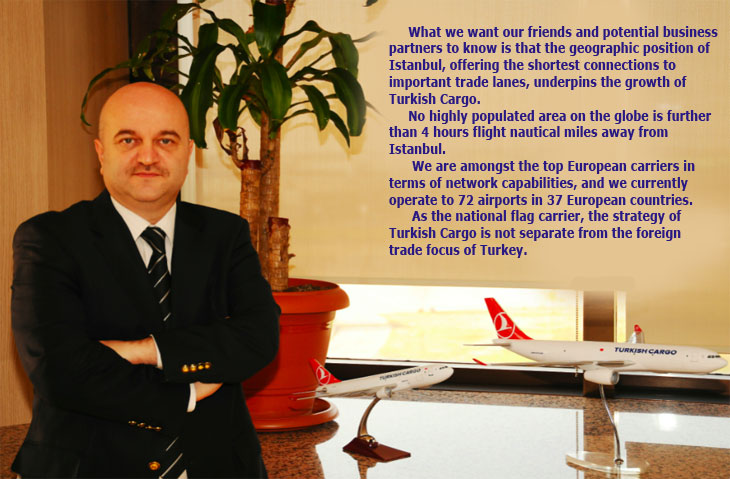Michael Vorwerk
CNS Report
At JFK Club
 The
JFK Air Cargo Association Luncheon on November 17, 2011 was held at
the International JFK Airport Hotel and featured as guest speaker Mr.
Michael Vorwerk, President for Cargo Network Services Corporation (CNS).
He is IATA Regional Director Cargo Americas, covering Canada, Central
/Latin America and Executive Director for Cargo 2000. Mr. Vorwerk covered
in his talk CNS updates, an industry overview, discussion of the Global
Cargo Agenda and E-Freight. The
JFK Air Cargo Association Luncheon on November 17, 2011 was held at
the International JFK Airport Hotel and featured as guest speaker Mr.
Michael Vorwerk, President for Cargo Network Services Corporation (CNS).
He is IATA Regional Director Cargo Americas, covering Canada, Central
/Latin America and Executive Director for Cargo 2000. Mr. Vorwerk covered
in his talk CNS updates, an industry overview, discussion of the Global
Cargo Agenda and E-Freight.
In introducing CNS, Mr. Vorwerk reminded
the audience that the corporation had been founded in 1985 “with
the objective of providing support to the newly deregulated air cargo
industry”. While factually correct, it didn’t explicitly
mention that this was after IATA lost its anti-trust immunity in the
U.S. Another interesting tidbit was the statement that “CNS is
structured as a “for profit” company and all our surpluses
are re-invested in industry development and reducing participation costs.
Its parent company, IATA remains non-profit in name and structure, but
equally has been acting de facto as a “for profit” organization
– a very fine line that is!
Next the CASS e-billing system was mentioned with its 2011 billings
of $5 billion and the “adjunct to these services”, the provision
of industry statistics based on data from its billing system, community
information and distribution services that leverage its nationwide network
of airlines and endorsed agents with 1,200 Agents and 2,500 offices
in the USA.
Talking about the falling margins, as
shown below, over the last 10 year period, Mr. Vorwerk remarked that
it was not unusual in the cyclical aviation business and this was the
reason airlines always found the decision to make capital investments
a difficult one.
Having largely recovered from the 2008-09
recession by 2010, and profitability back to acceptable levels, airlines
faced the rise of oil prices in Q4 which impacted the cost of jet fuel
and again profits declined. “Since then margins have been on their
way down, oil has continued to show price volatility but with a definite
rising trend and therefore margins going forward will become even smaller,”
said Mr. Vorwerk. Oil and jet fuel prices remain remarkably high given
the economic gloom and remain 30%-40% higher than 2010 levels. If we
have a recession then they will fall sharply, and if we muddle through,
then high fuel costs will remain a challenge
At the same time, in response to IATA surveys regarding whether volumes
and yields were rising or falling over the next twelve months, the results
for the period from March 2006 to April 2011 indicate that the consensus
was that volumes will continue to grow – marking a certain level
of confidence compared to earlier surveys - but only a slim majority
now expected yields to improve over the next twelve months, which is
a further deterioration in the position at the last survey.
The latest survey in October showed,
most expect volumes to hold up over the year ahead but the outlook for
yields is weakening. “The business inventory cycle is a key driver
of major turning points in air freight; whenever inventory/sales ratios
get out of line. While this looks OK for the time being, a fall in expected
sales, due to the general economic gloom, could have raised the inventory/expected
sales ratio in recent months and contributed to the latest fall in air
freight,” according to Mr. Vorwerk.
He went on to say that “once inventories
had risen to normal levels relative to sales, shippers no longer needed
more expensive airfreight to quickly get products to sales facilities
or components to production facilities. However, restocking is not the
only reason for using airfreight – so we could expect to see further
expansion of air cargo as final sales of consumer and capital goods
continue to grow back”.
The “good news” until April
this year was that world trade has been growing since 2009 and looked
poised to continue; however, world trade has stopped growing, which
is worrisome. In late 2010 the weakness in air freight was because of
losses in market share (partly commodity and trade lane effects as well
as mode [sea, road] shift), whereas now overall world trade is weakening
as the economic situation deteriorates.
The question arises that with inventories restocked,
yet world trade not growing, what are the implications for business
and its propensity to spend? This is where consumer confidence plays
a big role, as illustrated below:
“It’s a mixed bag”
says Vorwerk, “in Europe, represented by the red line, they have
lost confidence, with weak economies in the region coupled with tighter
fiscal policy and high unemployment that have caused the growth in confidence
to stall.
“Here in the U.S. they also lost
confidence, cutting spending on products manufactured and shipped from
Asia”. The figures in green are for China, a positive, where Chinese
consumers and consumers in other developing economies remain confident.
This will provide some support, but these consumers are still relatively
small compared to the U.S. and Europe.
So having taken a look at what airline
heads of cargo think, what business in general thinks, and what consumers
think, “we zeroed in on a group that should carry more weight
than most – purchasing managers,” says Vorwerk.
As global business goes, purchasing managers
in manufacturing around the world are a good indicator of trends. They
seem to have lost confidence, pointing to continued weakness. Their
actions usually lead growth in air freight by 2 months and they are
saying that they will not be increasing orders, which in the past has
at least meant an impact on the growth in the air cargo market.
To complete the sweep, we also have views
from economists; generally most forecasts still point to some growth
hotspots in Asia and Latin America while the view is that Europe may
‘muddle through’, in which case 2012 will see another year
of 2-speed economic growth, yet a European recession would likely drag
down the U.S. and Asia.
In the good news category, to sustain
some optimism, Mr. Vorwerk believes that despite such volatility in
the air cargo market, it is perhaps worth reassuring ourselves that,
in his opinion at least, despite these challenges, there will be an
ongoing demand for airfreight, and despite the current inhibitors, the
underlying drivers will still produce mid-single digit growth for the
global airfreight market in the short and medium term.
A case in point here at JFK, looking
at figures from the CASS statistics, we see that the global trend is
reflected locally. First quarter figures show a volume increase of +5%
year on year, with a corresponding increase of 12% in value.
The top 20 destinations from JFK indicate
clearly a volume impact with far east destination like Shanghai, Hong
Kong and Seoul; for Europe we see strong growth into BRU.
Moving on to the global cargo agenda,
Mr. Vorwerk said “if we take steps now to address some of the
underlying problems in our industry we can turn this downturn into the
basis for a stronger & better future”. This comprises “protecting
the industry’s cash through CASS, adopting and expanding e-business
measures, continued quality efforts with Cargo2000, work on safety and
security and last, but not least, the environment.
He indicated that all the necessary information
concerning the e-freight documents was available on the IATA web site,
together with the IATA handbook and local field resources. Keeping the
benefits in mind was important as these include lower costs, better
service, regulatory compliance and increased security. Equally, if not
even more important are key factors such as data quality and timeliness
which require the evaluation of internal processes and supply chain
performance, with Cargo2000 the industry’s quality system of performance
metrics and reporting. Vorwerk extended an invitation to an ongoing
dialogue with shippers and all other stakeholders improve communications.
Touching on IATA secure freight, he reiterated
the need for a harmonized global approach, securing cargo at the point
of origin rather than security checks for transfer cargo and the pilots
in Mexico & Chile in 2012. In the U.S., efforts are underway to
obtain recognition by the TSA for secure freight.
An ambitious tour de force from soup to
nuts, with few surprises, except no word about GACAG and what makes
CNS unique in a sea of CASS operations.
Ted Braun |




